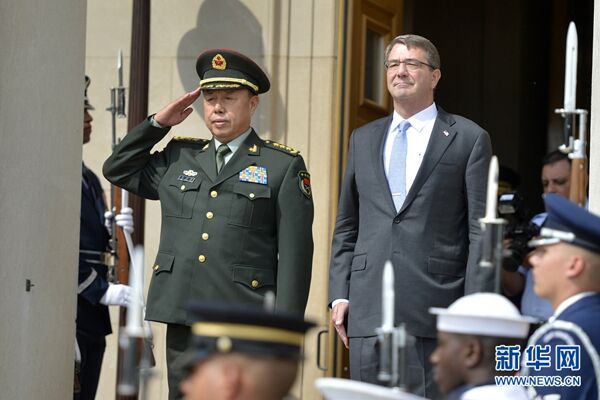Major Power Relations
Your Present Location: PROGRAMS> Major Power RelationsChina, U.S. seek new military relationship for greater good
The Vice Chairman of China`s Central Military Commission, Fan Chanlong’s visit to the United States is expected to usher in a new stage of China-U.S. military ties. His tour also helps create "a positive atmosphere" for Chinese President Xi Jinping’s scheduled trip to the US this coming September. The bilateral military relationship is becoming the highlight of overall China-U.S. diplomacy.
Fan defines a new type of China-U.S. military relationship that is built on "mutual trust, cooperation, non-conflict and sustainability," which is similar to what President Xi Jinping had proposed when he made a visit to the US in 2013. At the time, he met his U.S. counterpart Barack Obama at the Annenberg Estate in California.

China, U.S. seek new military relationship for greater good
The Chinese military expects to avoid misunderstandings and miscalculations with the U.S. side, and to maintain non-interrupted interactions with the Pentagon. Accordingly, the U.S. side should act in a more cooperative manner rather than engaging in provocative actions such as selling more advanced weapons to Taiwan and carrying out unrestricted military actions in the South China Sea.
Fan’s visit comes at a time when Sino-U.S. relations have gotten tense. Therefore, his visit highlights the strong will of the top leaders from both countries to avoid conflicts. Since last year, high-level officials in the U.S. have exerted more criticisms against China over South China Sea issues. The U.S. military also proposed to deploy more warships and aircraft to the region as well. Historically, these unfriendly gestures by the U.S. would inevitably lead to a temporary suspension of China-U.S. military exchanges; however China has risen in increasing confidence by not suspending bilateral military exchanges while continuing to send a military delegation at the highest level to visit the US.
Fan Changlong and U.S. Defense Secretary Ashton Carter held frank talks over various differences between the two countries. Both sides emphasized that the U.S. and Chinese militaries should strive to build a more cooperative relationship. China and the U.S. have agreed to improve communication and exchanges between senior officers of both militaries. The two countries hope to strengthen cooperation on more specific areas and to promote common benefits with such as establishing more effective working mechanisms. The two sides seek to enrich the rules of engagement to control risks and to avoid any misunderstandings and miscalculations.
The Chinese and the U.S. militaries are attempting to complete consultations on a series of new agreements that will be made prior to President Xi’s visit to the U.S. later this year, which include formulating the Code of Safe Conduct on Air Encounters and establishing a mutual notification mechanism of major military activities.
China and the U.S. have signed an agreement on exchanges between the Chinese and U.S. armies. Military personnel from both sides will be expected to cooperate in a number of military operations on land, such as the UN peacekeeping and humanitarian rescue missions. Fan stressed that the South China Sea issue was just one incident on the path of development of China-U.S. relations. He insists that both sides should take a long-term perspective and pay more attention to major international and regional issues. China also hopes the U.S. could decrease its warship-aircraft reconnaissance activities, an act that conveys no goodwill, in order to strengthen strategic mutual trust.
More than 70 years ago, the U.S. and Chinese militaries had fought together against Japanese Fascist military aggression. Tales of the "Flying Tigers” has become widely known in China. And 70 years later, the two sides should find ways to work together for sustaining peace and stability in the region. China has become more and more positive and pragmatic towards China-U.S. military exchanges and communications. Yet warhawks in Washington do not endorse such cooperation, as they demand to impose more severe restrictions on the China-U.S. military relationship. Obviously, their short-sighted and non-constructive proposition would likely harm the interests of the US.
The author is a senior fellow at Chongyang Institute for Financial Studies, Renmin University of China.
Weibo: @人大重阳 Wechat official account: rdcy2013
Key Words: Zhao Minghao; US; Military























































































 京公网安备 11010802037854号
京公网安备 11010802037854号





